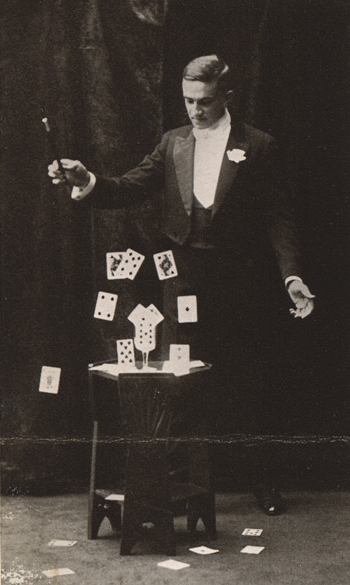Writing and Magic

As a fantasy writer, I spend much of my writing time about magic, how it works and its effects on the people and societies in my stories. In ‘The Laws of Magic’ series, for instance, magic is a codified, rational endeavour which is explored and experimented with in the same way that happens with science. The integration of magic with technology and other aspects of life provides a fascinating backdrop for the narrative.
After writing about magic so much, a few years ago I decided that it was time to stop being so theoretical. It was time to actually learn some magic.
I enrolled in a Council of Adult Education short course in Close Up Magic. Six Saturday mornings, three hour sessions run by the astonishing Simon Coronel. This young man is amazingly talented, a seasoned professional in demand here and overseas. In the first session he opened by just running through a few basic moves in front of us. And I mean, literally in front of us. He wouldn’t have been more than a metre away while the twenty course participants (we all fancied ourselves as cluey individuals, of course) watched as hard as we could, looking for the methods he used.
I couldn’t see a thing. Right in front of my eyes, he made coins disappear, cards turn into other cards, bits of rope pass right through his arms, the works. No doubt about it, this guy was magic.
Gradually, with great good humour and endless patience, Simon taught us all how to palm coins and force cards, at a beginner level of course. That didn’t stop us from feeling mighty proud of ourselves when we went home and wowed the family. Or not.
So now I can do a few bits and pieces when I do school visits, in between talking about my books. And after a while, practising with my Bicycle brand cards, it occurred to me that writing is actually a lot like magic or sleight of hand (or ‘close up illusions’ as Simon prefers).
It goes like this. Sleight of hand basically comes down to a combination of applied psychology and diversion. The applied psychology is working on held beliefs, getting people to assume what you want them to assume. It’s also about the persistence of memory – and the faultiness of memory, and using this to its fullest.
The diversion part is interesting. It’s the old ‘look over here while I arrange this rabbit under the table ready to be pulled out of the hat’. There are many methods to divert (and distract) the audience’s attention, and they’re all useful to a performer.
So how is this like writing? Well, the applied psychology is pretty straightforward. Writers are always playing with a reader’s assumptions and expectations, confounding them or fulfilling them – or stretching them out via the favourite tool of suspense. We seed red herrings, we foreshadow, we create sympathy for a character by revealing characteristics common to readers’ experiences and then we heartlessly use this to propel readers forward.
But diversion? That’s perhaps more subtle, and it goes pretty much like a magician getting you to look at that sleeve that he’s got nothing up, while he pulls something out of his pocket with the other hand. Writers get readers to concentrate on some breakneck narrative while we sift in some other stuff – background detail, character motivation, relationship indicators, weaknesses and fears, subtle details like that. We don’t want the reader to dwell on them, so we get them to look at the car chase, or the fist fight, or the heated argument between the woman and her no good cheating husband who is on his last chance and she means it this time. The reader is diverted, and doesn’t notice that their pocket is being picked while they’re at it. Or, rather, that something is being left in their pocket, something that will become very valuable later on.
It’s magic. Writing is like magic.
Fabulous blog, Michael. I love looking at what I do in a different way. Feeling quite inspired now (and thinking I need a good pointy hat!)
marvellous.
the last paragraph, especially.